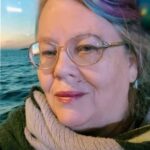Granny, my mother’s mother, told me one day what she wanted written on her gravestone. I suppose I was 16 or so. It was a quote from Rudyard Kipling, but my aunt, her daughter, passed on the wrong one to the undertaker, not the one she wanted. How do I know? I remember what Granny told me but not well enough to decipher my vague sense of her words into anything more than a shadow.
Nothing ever seemed to turn out right for Granny. As long as I knew her she could never change her story of pain and loss into something more. She couldn’t show me the way. I had to learn the hard way. But, she did pass on to me her way of hearing words in print come alive. She read with deep passion and used the Sears and other catalogues to collect books, a few at a time, even in her remote prairie home in Delburne, Alberta. She loved poetry, and was very familiar with the work of Kipling. I remember a verse she liked (but it wasn’t the one she meant for her grave. . . I can’t remember what that was. . . I’m sorry granny, but I don’t.)
“A fool there was and he made his prayer
(Even as you or I!)
to a rag and a bone and a hank of hair,
(We called her the woman who did not care)
But the fool he called her his lady fair – (Even as you or I!)…”
Kipling was describing a fetish, I suppose, something hand-made under a spell and meant for a purpose, who knows what the purpose was meant to be? And what shall we make of this dark old charm? I remember how Granny would laugh when she said these words, giving the quote great expression, her eyes snapping. What did they mean to her? What does Kipling’s capturing of that (to us) ancient moment in time mean to us in terms of intention or finding our own way? We can lose our sense of direction when we suffer emotional loss. Sometimes life experiences throw us into a struggle for survival against fierce odds and threaten our very being. When we suffer injustices that cannot be completely resolved we need to find a way toward self-healing. Retribution, anger or vengeance won’t work. Self-healing requires us to become whole in ourselves again. To get there, it may help to widen our focus and realize that we, all of us, at some time, in some life somewhere been not only broken refugees, but we’ve also been the oppressors. That’s how I found the emotional space I needed for healing. I had to accept and learn to let go. Granny was never good at letting go. Her loneliness seemed to deepen rather than resolve.
Individual pathways toward this state of enlightenment differ, but transcending the wreckage of our struggles may allow us to complete the journey back to full-hearted mercy, kindness, trust, compassion, giving and open-ness. We each are a bigger story than we know. When humanity has been stripped from us, how do we become human again? May we find Love Universal, and accept that we all are part of something more. Life seems to want to lead us back toward our most true, honest, complete self. We have to open ourselves to following the nudging of our inner awareness when it tries to lead.
My pathway allowed me to visit myself in former incarnations, where I saw myself playing roles I’d forgotten. I had to confront myself, and let go of the hurt caused by those who were meant to have taken care of me. The journey back was humbling. Shocking. But it opened the way for new understanding. Link to Notes on Hunger httml. I dream that someday I’ll meet Granny there on fresh new ground where we can hold hands and laugh together and I can thank her for all she tried to do.

